Deck 5: The Integumentary System Unit Ii: Principles of Support and Movement
Question
Question
Question
Question
Question
Question
Question
Question
Question
Question
Question
Question
Question
Question
Question
Question
Question
Question
Question
Question
Question
Question
Question
Question
Question
Question
Question
Question
Question
Question
Question
Question
Question
Question
Question
Question
Question
Question
Question
Question
Question
Question
Question
Question
Question
Question
Question
Question
Question
Question
Question
Question
Question
Question
Question
Question
Question
Question
Question
Question
Question
Question
Question
Question
Question
Question
Question
Question
Question
Question
Question
Question
Question
Question

Unlock Deck
Sign up to unlock the cards in this deck!
Unlock Deck
Unlock Deck
1/74
Play
Full screen (f)
Deck 5: The Integumentary System Unit Ii: Principles of Support and Movement
1
Which layer of the epidermis contains layers of flattened keratinocytes that are going through apoptosis?
A)Stratum basale
B)Stratum spinosum
C)Stratum granulosum
D)Stratum lucidum
E)Stratum corneum
A)Stratum basale
B)Stratum spinosum
C)Stratum granulosum
D)Stratum lucidum
E)Stratum corneum
C
2
Constant exposure of skin to friction stimulates the formation of a callus,which is the thickening of the _____ of the epidermis.
A)stratum basale
B)stratum spinosum
C)stratum granulosum
D)stratum lucidum
E)stratum corneum
A)stratum basale
B)stratum spinosum
C)stratum granulosum
D)stratum lucidum
E)stratum corneum
E
3
Albinism is the inherited inability to produce
A)melanin.
B)carotene.
C)both melanin and carotene.
D)keratin.
E)creatinine.
A)melanin.
B)carotene.
C)both melanin and carotene.
D)keratin.
E)creatinine.
A
4
Another name for the subcutaneous layer is
A)Dermis
B)Epidermis
C)Stratum corneum
D)Stratum basale
E)Hypodermis
A)Dermis
B)Epidermis
C)Stratum corneum
D)Stratum basale
E)Hypodermis

Unlock Deck
Unlock for access to all 74 flashcards in this deck.
Unlock Deck
k this deck
5
Which layer of the epidermis is composed of a single row of cuboidal or columnar keratinocytes?
A)Stratum basale
B)Stratum spinosum
C)Stratum granulosum
D)Stratum lucidum
E)Stratum corneum
A)Stratum basale
B)Stratum spinosum
C)Stratum granulosum
D)Stratum lucidum
E)Stratum corneum

Unlock Deck
Unlock for access to all 74 flashcards in this deck.
Unlock Deck
k this deck
6
This type of exocrine gland is a simple,branched acinar gland connected to a hair follicle.
A)Sebaceous gland
B)Sudoriferous gland
C)Both sebaceous gland and sudoriferous gland
D)None of these answers are correct
A)Sebaceous gland
B)Sudoriferous gland
C)Both sebaceous gland and sudoriferous gland
D)None of these answers are correct

Unlock Deck
Unlock for access to all 74 flashcards in this deck.
Unlock Deck
k this deck
7
This is fine non-pigmented hair that covers the body of the fetus.
A)Alopecia
B)Vellus
C)Lanugo
D)Papilla
E)Lunula
A)Alopecia
B)Vellus
C)Lanugo
D)Papilla
E)Lunula

Unlock Deck
Unlock for access to all 74 flashcards in this deck.
Unlock Deck
k this deck
8
Describe how fingerprints are formed and what they are used for.

Unlock Deck
Unlock for access to all 74 flashcards in this deck.
Unlock Deck
k this deck
9
Which pigment secreted by specialized cells in the skin is capable of absorbing ultraviolet light?
A)Keratin
B)Melanin
C)Melatonin
D)Carotene
E)Collagen
A)Keratin
B)Melanin
C)Melatonin
D)Carotene
E)Collagen

Unlock Deck
Unlock for access to all 74 flashcards in this deck.
Unlock Deck
k this deck
10
Which of the following structures found in the skin help prevent water loss and inhibit bacterial growth on the surface of the skin?
A)Arrector pili
B)Lunula
C)Sweat glands
D)Hair follicles
E)Oil glands
A)Arrector pili
B)Lunula
C)Sweat glands
D)Hair follicles
E)Oil glands

Unlock Deck
Unlock for access to all 74 flashcards in this deck.
Unlock Deck
k this deck
11
Keratin
A)is a protein.
B)is secreted by plasma cells to help protect the body from viruses.
C)is made by melanocytes only.
D)is both a protein and made by melanocytes only.
E)All of these choices are correct.
A)is a protein.
B)is secreted by plasma cells to help protect the body from viruses.
C)is made by melanocytes only.
D)is both a protein and made by melanocytes only.
E)All of these choices are correct.

Unlock Deck
Unlock for access to all 74 flashcards in this deck.
Unlock Deck
k this deck
12
Which of the following structures found in the skin plays an important role in thermoregulation?
A)Tactile epithelial cells (Merkel cells)
B)Sebaceous glands
C)Sweat glands
D)Nails
E)Fingerprints
A)Tactile epithelial cells (Merkel cells)
B)Sebaceous glands
C)Sweat glands
D)Nails
E)Fingerprints

Unlock Deck
Unlock for access to all 74 flashcards in this deck.
Unlock Deck
k this deck
13
Describe the structure and function of arrector pili.

Unlock Deck
Unlock for access to all 74 flashcards in this deck.
Unlock Deck
k this deck
14
Characteristics of thick skin include:
A)Found in the palms,soles of the feet and fingertips.
B)Does not contain hair follicles.
C)Contains more sweat glands than thin skin.
D)Contain epidermal ridges.
E)All of these choices are correct
A)Found in the palms,soles of the feet and fingertips.
B)Does not contain hair follicles.
C)Contains more sweat glands than thin skin.
D)Contain epidermal ridges.
E)All of these choices are correct

Unlock Deck
Unlock for access to all 74 flashcards in this deck.
Unlock Deck
k this deck
15
Which of the following is a mixture of triglycerides,cholesterol,proteins and inorganic salts?
A)Sweat
B)Lanugo
C)Vellus
D)Sebum
E)Mucus
A)Sweat
B)Lanugo
C)Vellus
D)Sebum
E)Mucus

Unlock Deck
Unlock for access to all 74 flashcards in this deck.
Unlock Deck
k this deck
16
Which layer of the skin is composed mainly of dense irregular connective tissue containing collagen and elastic fibers?
A)Hypodermis
B)Basement membrane
C)Epidermis
D)Dermis
E)Subcutaneous (subQ)layer
A)Hypodermis
B)Basement membrane
C)Epidermis
D)Dermis
E)Subcutaneous (subQ)layer

Unlock Deck
Unlock for access to all 74 flashcards in this deck.
Unlock Deck
k this deck
17
Which layer of the skin is composed of a keratinized stratified squamous epithelium?
A)Epidermis
B)Dermis
C)Hypodermis
D)Subcutaneous layer
E)Corpuscle
A)Epidermis
B)Dermis
C)Hypodermis
D)Subcutaneous layer
E)Corpuscle

Unlock Deck
Unlock for access to all 74 flashcards in this deck.
Unlock Deck
k this deck
18
Which epidermal cell has a role in immunity and disease resistance?
A)Intraepidermal macrophages (Langerhans cells)
B)Keratinocytes
C)Melanocytes
D)Tactile epithelial cells (Merkel cells)
E)Podocytes
A)Intraepidermal macrophages (Langerhans cells)
B)Keratinocytes
C)Melanocytes
D)Tactile epithelial cells (Merkel cells)
E)Podocytes

Unlock Deck
Unlock for access to all 74 flashcards in this deck.
Unlock Deck
k this deck
19
The stratum lucidum
A)contains lamellar granules.
B)lies just above the stratum basale.
C)is the layer used in a skin graft.
D)is present only in thick skin.
E)can consist of up to 25-30 layers of dead keratinocytes.
A)contains lamellar granules.
B)lies just above the stratum basale.
C)is the layer used in a skin graft.
D)is present only in thick skin.
E)can consist of up to 25-30 layers of dead keratinocytes.

Unlock Deck
Unlock for access to all 74 flashcards in this deck.
Unlock Deck
k this deck
20
The process of keratinization involves
A)synthesizing new pigment in the skin.
B)cells accumulating a tough fibrous protein that helps protect the skin.
C)changes occurring in thin skin only.
D)both synthesizing new pigment in the skin and cells accumulating a tough fibrous protein that helps protect the skin.
E)none of these answer choices are correct.
A)synthesizing new pigment in the skin.
B)cells accumulating a tough fibrous protein that helps protect the skin.
C)changes occurring in thin skin only.
D)both synthesizing new pigment in the skin and cells accumulating a tough fibrous protein that helps protect the skin.
E)none of these answer choices are correct.

Unlock Deck
Unlock for access to all 74 flashcards in this deck.
Unlock Deck
k this deck
21
In the diagram of skin shown below,where is the apocrine sweat gland?
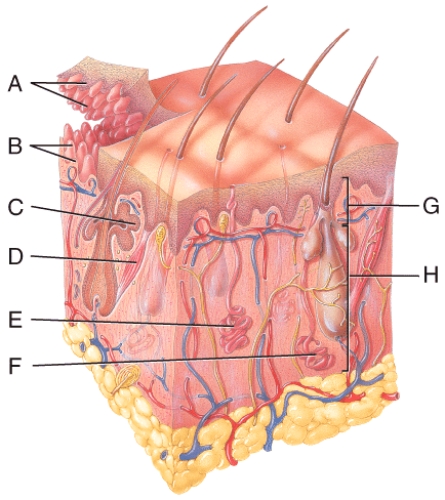
A)C
B)D
C)E
D)F
E)H

A)C
B)D
C)E
D)F
E)H

Unlock Deck
Unlock for access to all 74 flashcards in this deck.
Unlock Deck
k this deck
22
In the figure of a sagittal section of a fingernail shown below,where is the nail root?
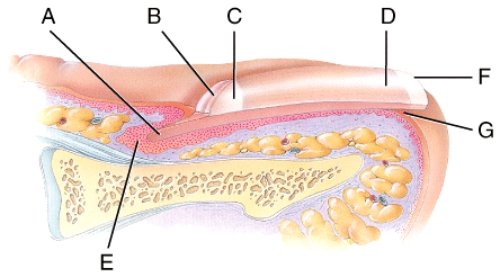
A)A
B)C
C)E
D)F
E)G

A)A
B)C
C)E
D)F
E)G

Unlock Deck
Unlock for access to all 74 flashcards in this deck.
Unlock Deck
k this deck
23
Briefly describe the steps in deep wound healing.

Unlock Deck
Unlock for access to all 74 flashcards in this deck.
Unlock Deck
k this deck
24
In the photomicrograph of a portion of thick skin shown below,which layer is the stratum basale?
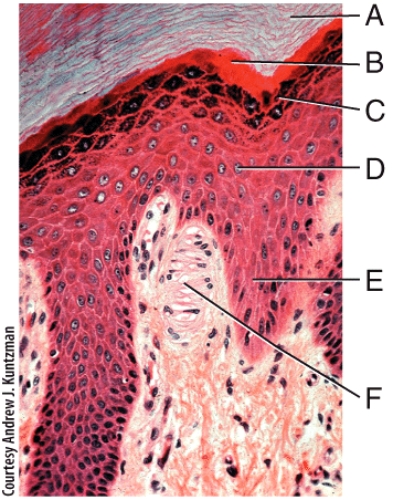
A)A
B)B
C)D
D)E
E)F

A)A
B)B
C)D
D)E
E)F

Unlock Deck
Unlock for access to all 74 flashcards in this deck.
Unlock Deck
k this deck
25
In the diagram of skin shown below,where is the reticular region of the dermis?
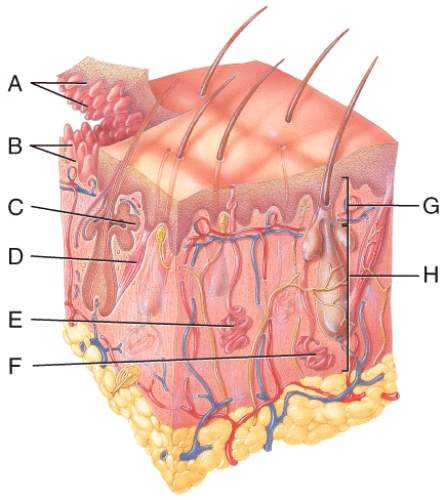
A)E
B)F
C)G
D)H
E)A

A)E
B)F
C)G
D)H
E)A

Unlock Deck
Unlock for access to all 74 flashcards in this deck.
Unlock Deck
k this deck
26
In the photomicrograph of a portion of thick skin shown below,which layer is the stratum spinosum?
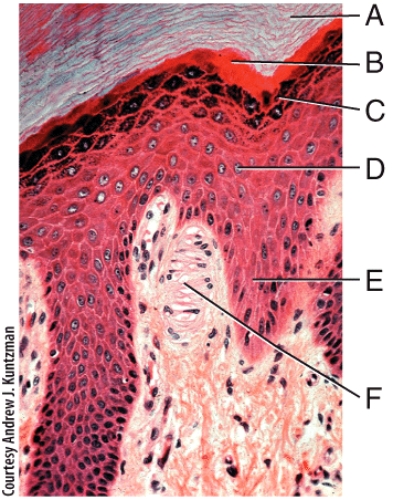
A)A
B)B
C)C
D)D
E)E

A)A
B)B
C)C
D)D
E)E

Unlock Deck
Unlock for access to all 74 flashcards in this deck.
Unlock Deck
k this deck
27
Which type of exocrine gland is a simple,coiled tubular gland that is found throughout almost the entirety of the skin?
A)Sebaceous gland
B)Eccrine sweat gland
C)Apocrine sweat gland
D)Ceruminous gland
E)None of these answer choices are correct.
A)Sebaceous gland
B)Eccrine sweat gland
C)Apocrine sweat gland
D)Ceruminous gland
E)None of these answer choices are correct.

Unlock Deck
Unlock for access to all 74 flashcards in this deck.
Unlock Deck
k this deck
28
In the diagram of a hair root shown,where is the cuticle of the hair?
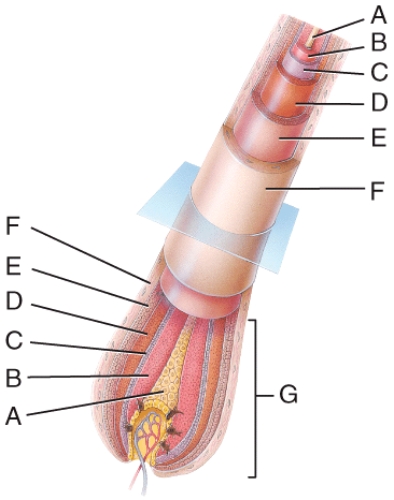
A)A
B)B
C)C
D)D
E)E

A)A
B)B
C)C
D)D
E)E

Unlock Deck
Unlock for access to all 74 flashcards in this deck.
Unlock Deck
k this deck
29
List and briefly describe the major functions of the skin.

Unlock Deck
Unlock for access to all 74 flashcards in this deck.
Unlock Deck
k this deck
30
In the figure of a sagittal section of a fingernail shown,where is the hyponychium (nail bed)?
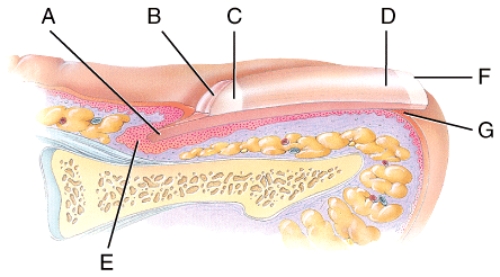
A)B
B)C
C)E
D)F
E)G

A)B
B)C
C)E
D)F
E)G

Unlock Deck
Unlock for access to all 74 flashcards in this deck.
Unlock Deck
k this deck
31
In the photomicrograph of a portion of thick skin shown below,which layer is only seen in thick skin?
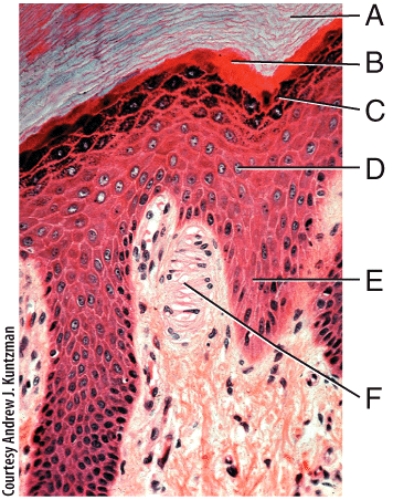
A)A
B)B
C)C
D)D
E)E

A)A
B)B
C)C
D)D
E)E

Unlock Deck
Unlock for access to all 74 flashcards in this deck.
Unlock Deck
k this deck
32
In which type of scar does the scar tissue extend beyond the boundary of the injury into normal tissue?
A)Hypertrophic scar
B)Keloid scar
C)Proliferative scar
D)Inhibitory scar
E)Granuloma
A)Hypertrophic scar
B)Keloid scar
C)Proliferative scar
D)Inhibitory scar
E)Granuloma

Unlock Deck
Unlock for access to all 74 flashcards in this deck.
Unlock Deck
k this deck
33
In the diagram of skin shown below,which labeled structure generates fingerprints?
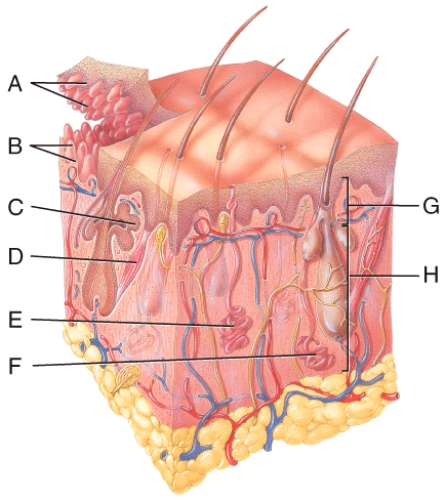
A)A
B)B
C)G
D)H
E)None of these answer choices are correct.

A)A
B)B
C)G
D)H
E)None of these answer choices are correct.

Unlock Deck
Unlock for access to all 74 flashcards in this deck.
Unlock Deck
k this deck
34
In the figure of a sagittal section of a fingernail shown below,where is the nail matrix?
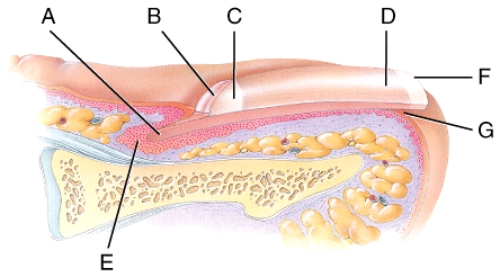
A)A
B)C
C)E
D)F
E)G

A)A
B)C
C)E
D)F
E)G

Unlock Deck
Unlock for access to all 74 flashcards in this deck.
Unlock Deck
k this deck
35
In the diagram of skin shown below,where is the arrector pili muscle?
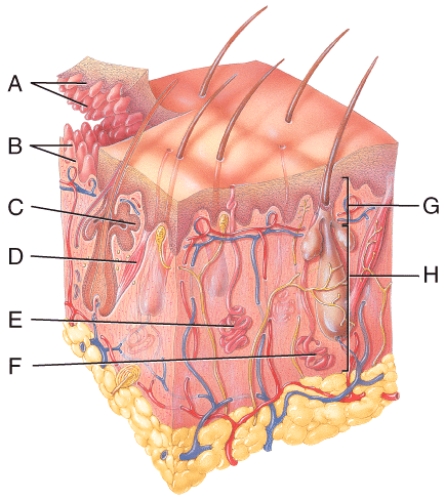
A)C
B)D
C)E
D)F
E)G

A)C
B)D
C)E
D)F
E)G

Unlock Deck
Unlock for access to all 74 flashcards in this deck.
Unlock Deck
k this deck
36
In the diagram of skin shown below,where is the sebaceous gland?
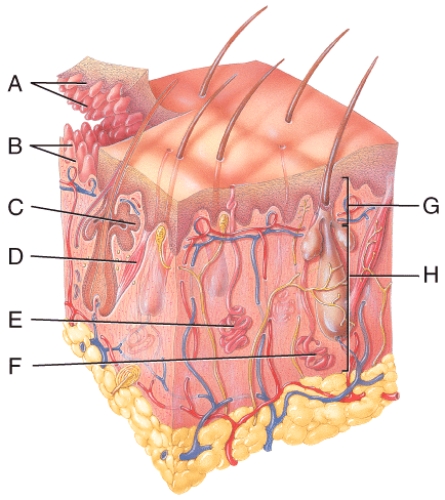
A)C
B)D
C)E
D)F
E)H

A)C
B)D
C)E
D)F
E)H

Unlock Deck
Unlock for access to all 74 flashcards in this deck.
Unlock Deck
k this deck
37
Briefly describe the steps in epidermal wound healing.

Unlock Deck
Unlock for access to all 74 flashcards in this deck.
Unlock Deck
k this deck
38
In the figure of a sagittal section of a fingernail shown,where is the eponychium (cuticle)?
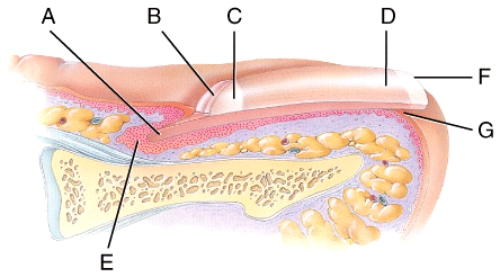
A)A
B)B
C)E
D)F
E)G

A)A
B)B
C)E
D)F
E)G

Unlock Deck
Unlock for access to all 74 flashcards in this deck.
Unlock Deck
k this deck
39
In the diagram of a hair root shown,where is the dermal root sheath?
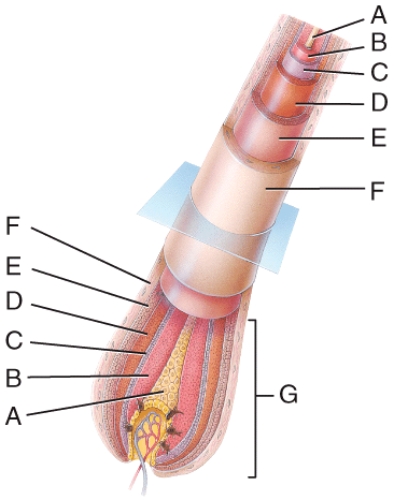
A)C
B)D
C)E
D)F
E)G

A)C
B)D
C)E
D)F
E)G

Unlock Deck
Unlock for access to all 74 flashcards in this deck.
Unlock Deck
k this deck
40
In the diagram of a hair root shown,where is the cortex?
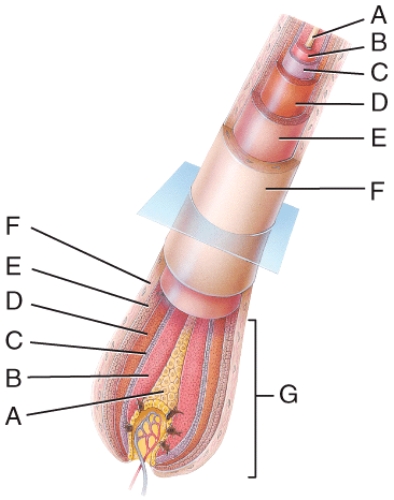
A)B
B)C
C)D
D)E
E)F

A)B
B)C
C)D
D)E
E)F

Unlock Deck
Unlock for access to all 74 flashcards in this deck.
Unlock Deck
k this deck
41
Describe the structural characteristics of the epidermis that contribute to its ability to protect the surface of an animal.

Unlock Deck
Unlock for access to all 74 flashcards in this deck.
Unlock Deck
k this deck
42
Describe the major differences between thin skin and thick skin.

Unlock Deck
Unlock for access to all 74 flashcards in this deck.
Unlock Deck
k this deck
43
In the diagram,which layer is the stratum granulosum?
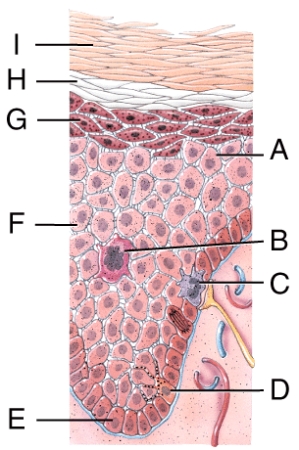
A)E
B)F
C)G
D)H
E)I

A)E
B)F
C)G
D)H
E)I

Unlock Deck
Unlock for access to all 74 flashcards in this deck.
Unlock Deck
k this deck
44
In the diagram,which is a melanocyte?
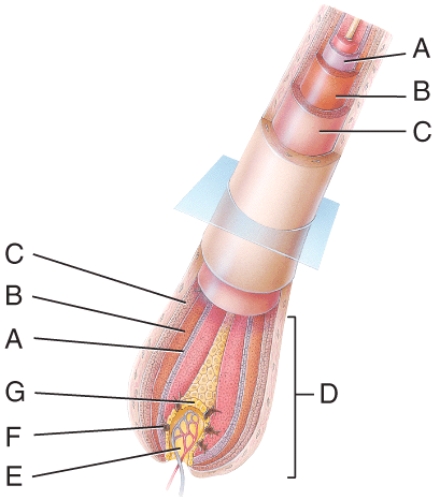
A)A
B)B
C)E
D)F
E)G

A)A
B)B
C)E
D)F
E)G

Unlock Deck
Unlock for access to all 74 flashcards in this deck.
Unlock Deck
k this deck
45
John has just been brought into the emergency room following a fiery explosion at a chemical plant.He is diagnosed with third degree burns over the anterior surfaces of his arms and trunk.What specific structural damage has occurred to his skin? What risks to John's life have resulted from this damage?

Unlock Deck
Unlock for access to all 74 flashcards in this deck.
Unlock Deck
k this deck
46
Which structure in the figure detects touch sensations?
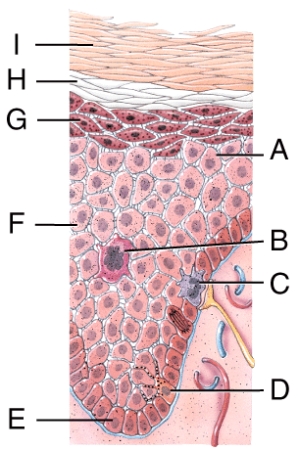
A)A
B)B
C)C
D)D
E)G

A)A
B)B
C)C
D)D
E)G

Unlock Deck
Unlock for access to all 74 flashcards in this deck.
Unlock Deck
k this deck
47
Which structure in the figure produces a pigment that contributes to skin color and absorbs UV radiation?
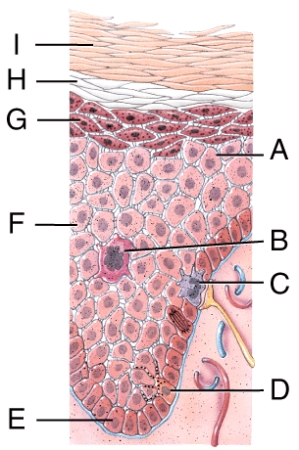
A)A
B)B
C)C
D)D
E)G

A)A
B)B
C)C
D)D
E)G

Unlock Deck
Unlock for access to all 74 flashcards in this deck.
Unlock Deck
k this deck
48
Which structure in the figure is a receptor sensitive to pressure?
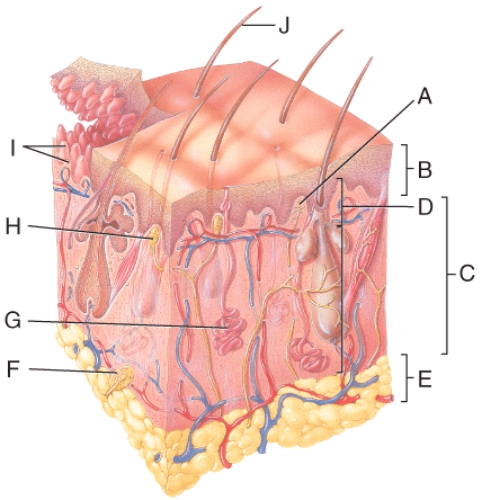
A)A
B)G
C)F
D)H
E)I

A)A
B)G
C)F
D)H
E)I

Unlock Deck
Unlock for access to all 74 flashcards in this deck.
Unlock Deck
k this deck
49
Which of the following best describes the events occurring at point B in the diagram of deep wound healing shown below?
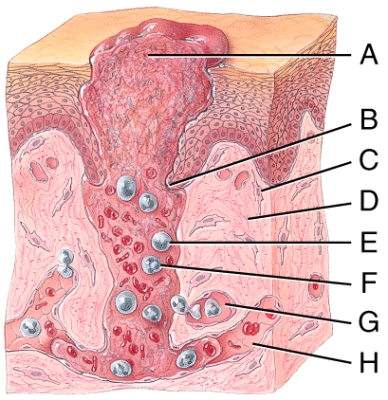
A)Blood clot is forming.
B)New collagen fibers are forming.
C)Damaged blood vessels are being repaired.
D)Epithelium is migrating across wound.
E)Scar tissue is forming.

A)Blood clot is forming.
B)New collagen fibers are forming.
C)Damaged blood vessels are being repaired.
D)Epithelium is migrating across wound.
E)Scar tissue is forming.

Unlock Deck
Unlock for access to all 74 flashcards in this deck.
Unlock Deck
k this deck
50
In the diagram,which layer is the stratum corneum?
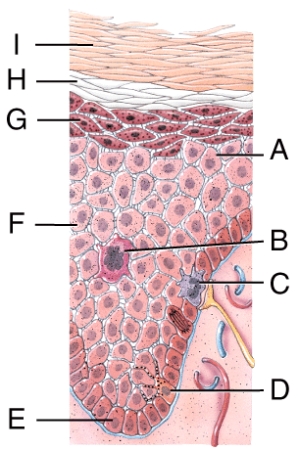
A)E
B)F
C)G
D)H
E)I

A)E
B)F
C)G
D)H
E)I

Unlock Deck
Unlock for access to all 74 flashcards in this deck.
Unlock Deck
k this deck
51
Which of the labeled cells in the diagram of deep wound healing shown below has phagocytic properties?
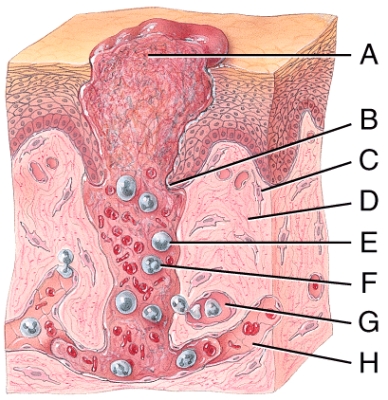
A)C
B)E
C)F
D)All of these answer choices are correct.
E)Both E and F

A)C
B)E
C)F
D)All of these answer choices are correct.
E)Both E and F

Unlock Deck
Unlock for access to all 74 flashcards in this deck.
Unlock Deck
k this deck
52
Which of the following best describes the events occurring at point A in the diagram of deep wound healing shown below?
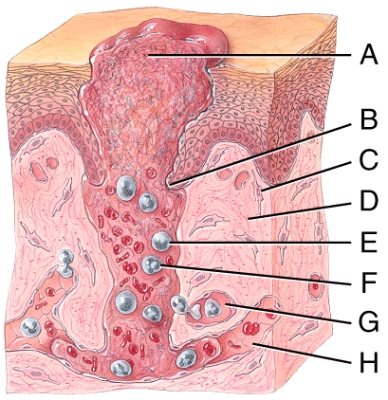
A)Blood clot is forming.
B)New collagen fibers are forming.
C)Damaged blood vessels are being repaired.
D)Epithelium is migrating across wound.
E)Scar tissue is forming.

A)Blood clot is forming.
B)New collagen fibers are forming.
C)Damaged blood vessels are being repaired.
D)Epithelium is migrating across wound.
E)Scar tissue is forming.

Unlock Deck
Unlock for access to all 74 flashcards in this deck.
Unlock Deck
k this deck
53
In the diagram,which is the hair matrix?
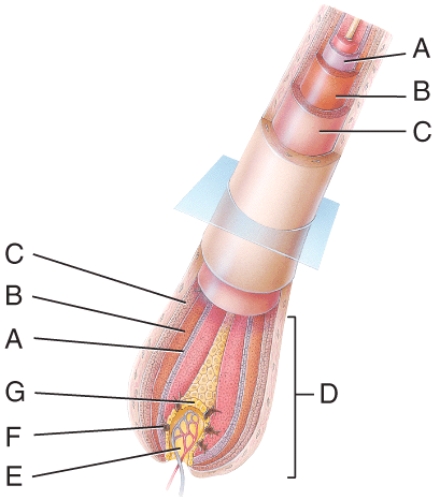
A)A
B)B
C)C
D)D
E)G

A)A
B)B
C)C
D)D
E)G

Unlock Deck
Unlock for access to all 74 flashcards in this deck.
Unlock Deck
k this deck
54
Which letter is pointing to the subcutaneous layer of the skin in the figure?
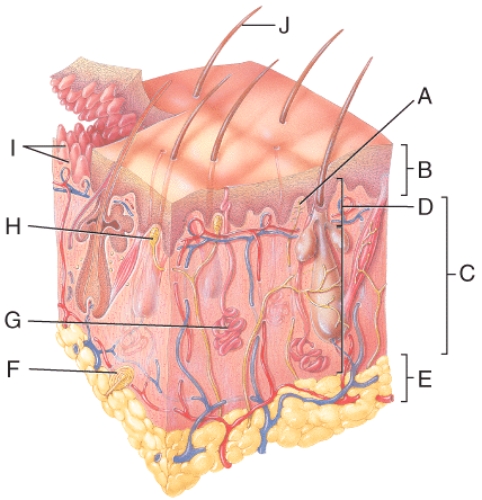
A)C
B)E
C)B
D)J
E)I

A)C
B)E
C)B
D)J
E)I

Unlock Deck
Unlock for access to all 74 flashcards in this deck.
Unlock Deck
k this deck
55
Which structures are dermal papillae?
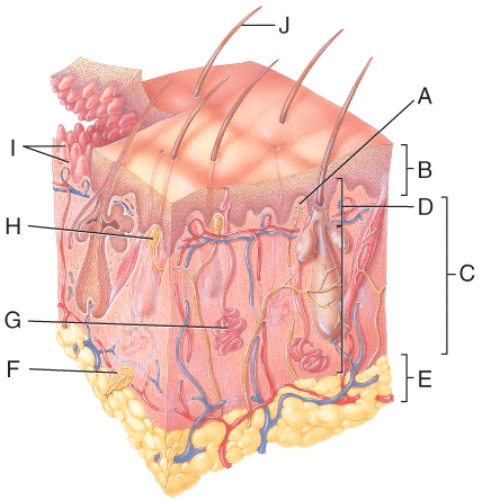
A)A
B)F
C)G
D)H
E)I

A)A
B)F
C)G
D)H
E)I

Unlock Deck
Unlock for access to all 74 flashcards in this deck.
Unlock Deck
k this deck
56
Which structure in the figure produces a protein that helps protect the skin and underlying tissues from heat,microbes and chemicals?
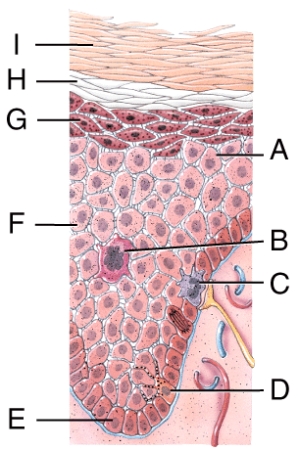
A)A
B)B
C)C
D)D
E)E

A)A
B)B
C)C
D)D
E)E

Unlock Deck
Unlock for access to all 74 flashcards in this deck.
Unlock Deck
k this deck
57
Which structures in the figure are sensitive to warmth,coolness and itching?
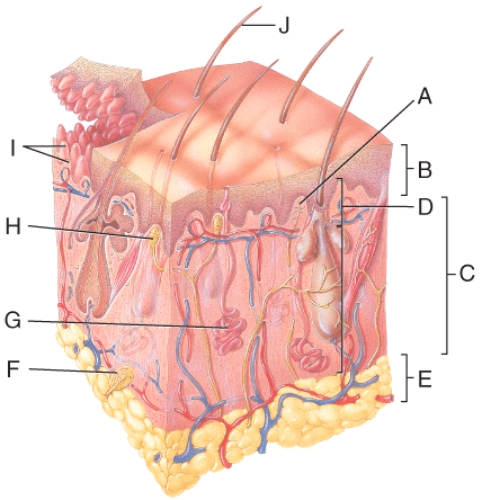
A)A
B)G
C)F
D)H
E)J

A)A
B)G
C)F
D)H
E)J

Unlock Deck
Unlock for access to all 74 flashcards in this deck.
Unlock Deck
k this deck
58
Which structure is an eccrine sweat gland?
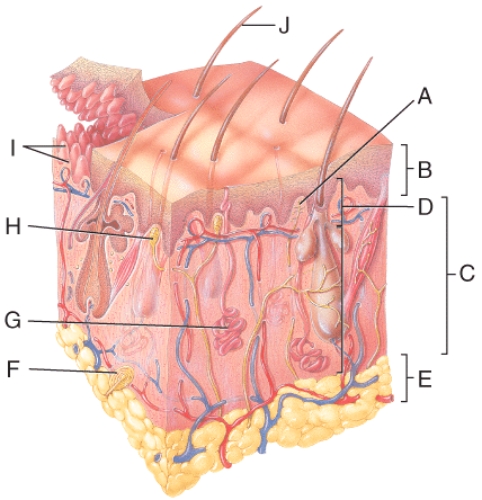
A)A
B)F
C)G
D)H
E)I

A)A
B)F
C)G
D)H
E)I

Unlock Deck
Unlock for access to all 74 flashcards in this deck.
Unlock Deck
k this deck
59
The corpuscle of touch (Meissner corpuscle)would be found in which region of the skin shown in the figure?
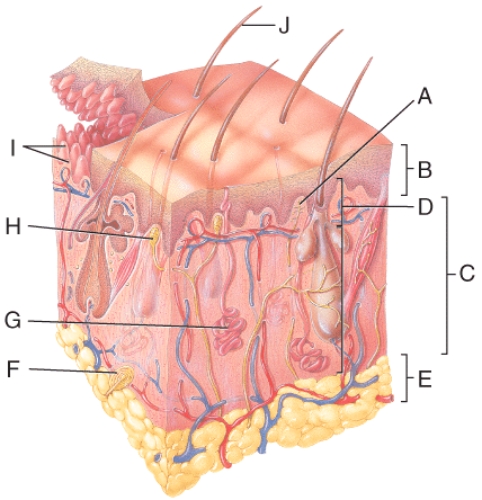
A)B
B)D
C)E
D)J
E)None of these answer choices are correct.

A)B
B)D
C)E
D)J
E)None of these answer choices are correct.

Unlock Deck
Unlock for access to all 74 flashcards in this deck.
Unlock Deck
k this deck
60
In the figure of a sagittal section of a fingernail shown,where is the lunula?
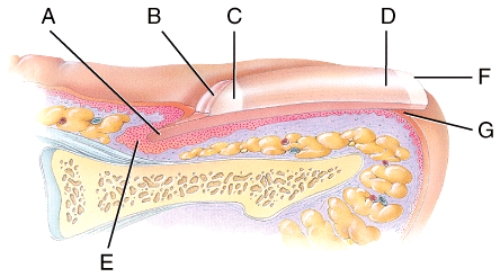
A)A
B)B
C)C
D)D
E)E

A)A
B)B
C)C
D)D
E)E

Unlock Deck
Unlock for access to all 74 flashcards in this deck.
Unlock Deck
k this deck
61
"Goose bumps" are caused by
A)action of arrector pili muscles.
B)secretions from the sudoriferous glands.
C)contraction of dermal papillae.
D)stimulation of hair root plexus.
E)secretions from the sebaceous gland.
A)action of arrector pili muscles.
B)secretions from the sudoriferous glands.
C)contraction of dermal papillae.
D)stimulation of hair root plexus.
E)secretions from the sebaceous gland.

Unlock Deck
Unlock for access to all 74 flashcards in this deck.
Unlock Deck
k this deck
62
Which condition results from androgens inhibiting hair growth in genetically predisposed adults?
A)hirsutism
B)pallor
C)jaundice
D)male-pattern baldness
E)erythema
A)hirsutism
B)pallor
C)jaundice
D)male-pattern baldness
E)erythema

Unlock Deck
Unlock for access to all 74 flashcards in this deck.
Unlock Deck
k this deck
63
Which of the following chemicals does NOT contribute to the color of human skin?
A)carotene
B)hemoglobin
C)pheomelanin
D)eumelanin
E)melatonin
A)carotene
B)hemoglobin
C)pheomelanin
D)eumelanin
E)melatonin

Unlock Deck
Unlock for access to all 74 flashcards in this deck.
Unlock Deck
k this deck
64
Which of the following is NOT a homeostatic contribution of skin?
A)Help provide calcium ions needed for muscle contraction
B)Provide sensory input to the brain
C)Help activate vitamin B
D)Help activate vitamins D
E)Thermoregulation
A)Help provide calcium ions needed for muscle contraction
B)Provide sensory input to the brain
C)Help activate vitamin B
D)Help activate vitamins D
E)Thermoregulation

Unlock Deck
Unlock for access to all 74 flashcards in this deck.
Unlock Deck
k this deck
65
Describe the structure and function of the different types of exocrine glands found in the skin

Unlock Deck
Unlock for access to all 74 flashcards in this deck.
Unlock Deck
k this deck
66
Which condition is due to a buildup of bilirubin pigment in the skin?
A)hirsutism
B)pallor
C)jaundice
D)androgenic alopecia
E)erythema
A)hirsutism
B)pallor
C)jaundice
D)androgenic alopecia
E)erythema

Unlock Deck
Unlock for access to all 74 flashcards in this deck.
Unlock Deck
k this deck
67
From which of the primary germ layers of the embryo does the epidermis of the skin develop?
A)Endoderm
B)Ectoderm
C)Mesoderm
D)All of these choices are correct.
E)Both endoderm and ectoderm.
A)Endoderm
B)Ectoderm
C)Mesoderm
D)All of these choices are correct.
E)Both endoderm and ectoderm.

Unlock Deck
Unlock for access to all 74 flashcards in this deck.
Unlock Deck
k this deck
68
Which of the following terms refers to paleness of the skin such as seen in patients with shock or anemia?
A)hirsutism
B)pallor
C)jaundice
D)androgenic alopecia
E)erythema
A)hirsutism
B)pallor
C)jaundice
D)androgenic alopecia
E)erythema

Unlock Deck
Unlock for access to all 74 flashcards in this deck.
Unlock Deck
k this deck
69
Which of the following terms refers to a hardened and thickened area of skin resulting from persistent pressure and friction?
A)callus
B)blister
C)wart
D)papule
E)fever blister
A)callus
B)blister
C)wart
D)papule
E)fever blister

Unlock Deck
Unlock for access to all 74 flashcards in this deck.
Unlock Deck
k this deck
70
In the diagram,which is the papilla of the hair?
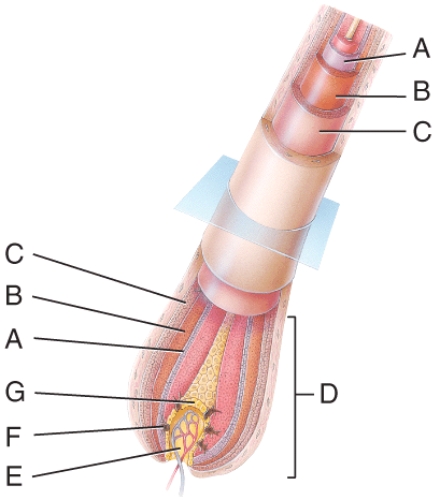
A)A
B)C
C)E
D)F
E)G

A)A
B)C
C)E
D)F
E)G

Unlock Deck
Unlock for access to all 74 flashcards in this deck.
Unlock Deck
k this deck
71
You stepped on a nail.List the sequential layers (or strata)of the epidermis that the nail penetrated through to finally reach the dermis.
A)basale,spinosum,granulosom,corneum
B)granulosom,spinosum,lucidum,corneum,basale
C)corneum,lucidum,granulosom,spinosum,basale
D)corneum,granulosom,spinosum,basale
E)corneum,granulosom,lucidum,spinosum,basale
A)basale,spinosum,granulosom,corneum
B)granulosom,spinosum,lucidum,corneum,basale
C)corneum,lucidum,granulosom,spinosum,basale
D)corneum,granulosom,spinosum,basale
E)corneum,granulosom,lucidum,spinosum,basale

Unlock Deck
Unlock for access to all 74 flashcards in this deck.
Unlock Deck
k this deck
72
Which of the following terms refers to an irregular tear of the skin?
A)abrasion
B)papule
C)keloid
D)laceration
E)cyst
A)abrasion
B)papule
C)keloid
D)laceration
E)cyst

Unlock Deck
Unlock for access to all 74 flashcards in this deck.
Unlock Deck
k this deck
73
Which of the following terms refers to an inflammation of the skin characterized by patches of redness,blistering,and extreme itching?
A)papule
B)laceration
C)keratosis
D)frostbite
E)eczema
A)papule
B)laceration
C)keratosis
D)frostbite
E)eczema

Unlock Deck
Unlock for access to all 74 flashcards in this deck.
Unlock Deck
k this deck
74
Which of the following terms refers to reddened,elevated,and itchy patches of skin commonly caused by emotional stress,physical trauma,or certain food allergies?
A)wart
B)hives
C)papule
D)cyst
E)eczema
A)wart
B)hives
C)papule
D)cyst
E)eczema

Unlock Deck
Unlock for access to all 74 flashcards in this deck.
Unlock Deck
k this deck


